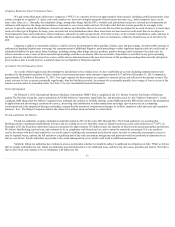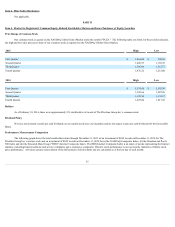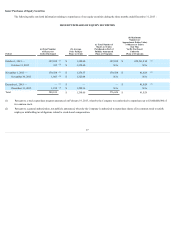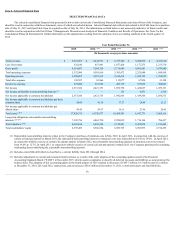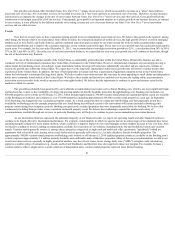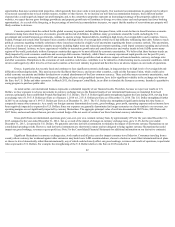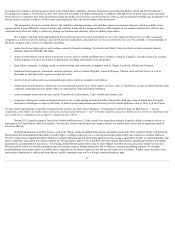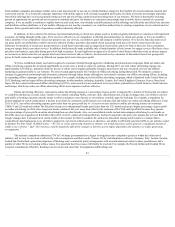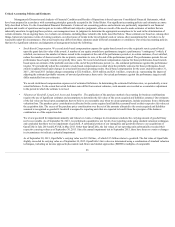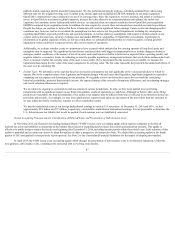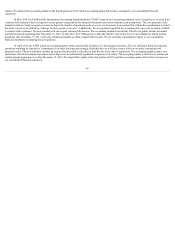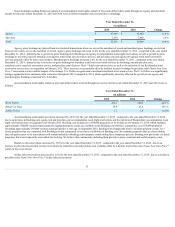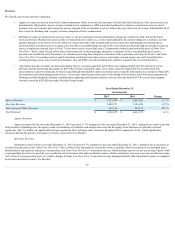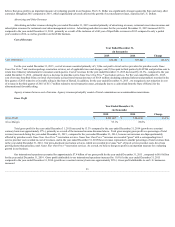Priceline 2015 Annual Report Download - page 46
Download and view the complete annual report
Please find page 46 of the 2015 Priceline annual report below. You can navigate through the pages in the report by either clicking on the pages listed below, or by using the keyword search tool below to find specific information within the annual report.
becoming more expensive for Europeans to travel to the United States. Similarly, dramatic depreciation of the Russian Ruble in 2014 and 2015 resulted in it
becoming more expensive for Russians to travel to Europe and most other non-Ruble destinations. In addition, although lower oil prices may lead to increased
travel activity as consumers have more discretionary funds and airline fares decrease, recent declines in oil prices and stock market volatility may be indicative of
broader macro-economic weakness, which in turn could negatively affect the travel industry and our business.
The uncertainty of macro-economic factors, the volatility in foreign exchange rates and their impact on consumer behavior, which may differ across
regions, makes it more difficult to forecast industry and consumer trends and the timing and degree of their impact on our markets and business, which in turn
could adversely affect our ability to effectively manage our business and adversely affect our results of operations.
We compete with both online and traditional travel and restaurant reservation and related services. The market for the services we offer is intensely
competitive, a trend we expect to continue, and current and new competitors can launch new services at a relatively low cost. We currently, or may potentially in
the future, compete with a variety of companies, including:
• online travel reservation services such as those owned by Expedia (including Travelocity and Orbitz), Ctrip (in which we hold a minority interest),
Rakuten, eDreams ODIGEO and Jalan;
• online accommodation search and/or reservation services, such as Airbnb and HomeAway (which is owned by Expedia), currently focused on vacation
rental properties and other non-hotel accommodations, including individually owned properties;
• large online companies, including search, social networking and marketplace companies such as Google, Facebook, Alibaba and Groupon;
• traditional travel agencies, wholesalers and tour operators, such as Carlson Wagonlit, American Express, Thomas Cook and Tui Travel, as well as
thousands of individual travel agencies around the world;
• travel service providers such as accommodation providers, rental car companies and airlines;
• online travel search and price comparison services (generally referred to as "meta-search" services), such as TripAdvisor, trivago (in which Expedia holds
a majority ownership interest), Qunar (which is controlled by Ctrip) and HotelsCombined;
• online restaurant reservation services, such as TripAdvisor's LaFourchette, Yelp's SeatMe and Zomato; and
• companies offering new rental car business models or car- or ride-sharing services that affect demand for rental cars, some of which have developed
innovative technologies to improve efficiency of point-to-point transportation and extensively utilize mobile platforms, such as Uber, Lyft and Zipcar.
For more detail regarding the competitive trends and risks we face, see Part I Item 1 Business - "Competition" and Part I Item 1A Risk Factors - " Intense
competition could reduce our market share and harm our financial performance. " and " Consumer adoption and use of mobile devices create new challenges and
may enable device companies such as Apple to compete directly with us. "
During 2015, Expedia acquired Travelocity, Orbitz and HomeAway. To the extent these acquisitions enhance Expedia's ability to compete with us, in
particular in the United States, which is Expedia's, Travelocity's, Orbitz's and HomeAway's largest market, our market share and results of operations could be
adversely affected.
Widespread adoption of mobile devices, such as the iPhone, Android-enabled smart phones and tablets such as the iPad, coupled with the web browsing
functionality and development of thousands of useful "apps" available on these devices, is driving substantial online traffic and commerce to mobile platforms.
We have experienced a significant shift of business to mobile platforms and our advertising partners are also seeing a rapid shift of traffic to mobile platforms. Our
major competitors and certain new market entrants are offering mobile apps for travel products and other mobile functionality, including proprietary last-minute
discounts for accommodation reservations. Advertising and distribution opportunities may be more limited on mobile devices given their smaller screen sizes.
The gross profit earned on a mobile transaction may be less than a typical desktop transaction due to different consumer purchasing patterns. For example,
accommodation reservations made on a mobile device typically are for shorter lengths of stay and are not made as far in advance. Further, given the device sizes
and technical limitations of tablets and smart phones, mobile consumers may not be willing to download multiple apps
43


